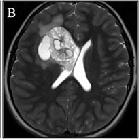extraventrikuläres Neurozytom







Extraventricular neurocytomas, previously known as cerebral neurocytomas, are rare WHO grade II primary CNS neoplasms usually arising in the cerebral hemispheres. They are, as the name implies, extraventricular versions of central neurocytomas.
Epidemiology
These tumors are reported at essentially all ages without a sex predilection .
Clinical presentation
No specific clinical features are present, with presentation depending on the size and location fo the tumor. Seizures, headache and focal neurological defects are typical manifestations.
Pathology
Extraventricular neurocytomas can occur anywhere in the CNS, including the spinal cord .
Microscopic appearance
The tumors are of neuronal origin and are similar to the comparatively more common central neurocytomas which are intraventricular. They too demonstrate a variety of histological patterns but are generally less cellular densely .
Immunophenotype
- synaptophysin: positive and essential to the diagnosis
- GFAP: may be positive if an astrocytic component is present
- IDH R132H: negative
Genetics
IDH mutations are absent and are critical in distinguishing an extraventricular neurocytoma from the more common oligodendroglioma, as both can demonstrate 1p19q co-deletion .
Variants
When a distinct ganglion cell population is present the term ganglioneurocytoma can be used .
Radiographic features
Lesions tend to be generally circumscribed, complex and sometimes large, complex, and variably enhancing masses. Theyare often partly or mainly cystic and calcification is not uncommon(>10%). They may or may not be associated with peritumoral edema.
MRI
In most instances, they are well-defined, often mixed cystic heterogeneously solid lesions that involve the deep white matteror the cortical grey matter of the cerebral hemispheres.
T1 C+: solidportions may show varying degrees of enhancement
Treatment and prognosis
As these are relatively indolent and well-demarcated tumors, complete surgical resection can effect a cure . CSF dissemination is reported but is rare .
Differential diagnoses
- ganglioglioma and gangliocytoma
- pleomorphic xanthoastrocytoma
- pilocytic astrocytoma
- diffuse astrocytoma, particularly gemistocytic astrocytoma and oligodendrogliomas
- papillary glioneuronal tumor
- rosette-forming glioneuronal tumors (usually midline and often posterior fossa)
- diffuse leptomeningeal glioneuronal tumor (when leptomeningeal spread is prominent)
Siehe auch:
- Gangliogliom
- Dysembryoplastischer neuroepithelialer Tumor
- Gangliozytom
- intraventrikuläres Neurozytom
- Neurozytom
- WHO Grade II
und weiter:

 Assoziationen und Differentialdiagnosen zu extraventrikuläres Neurozytom:
Assoziationen und Differentialdiagnosen zu extraventrikuläres Neurozytom:




